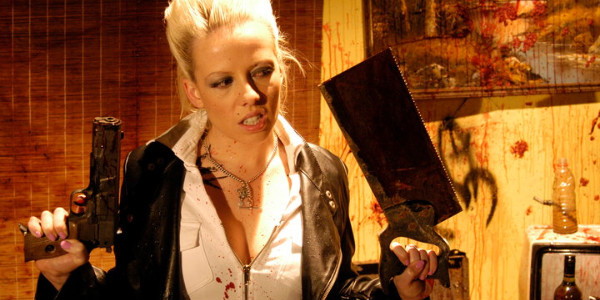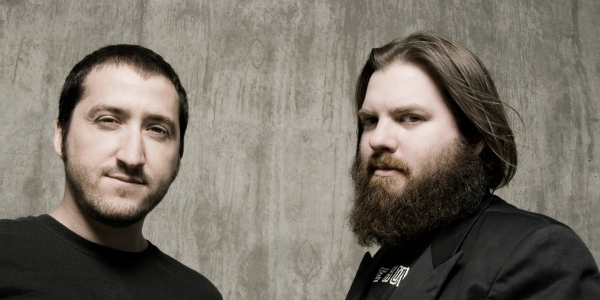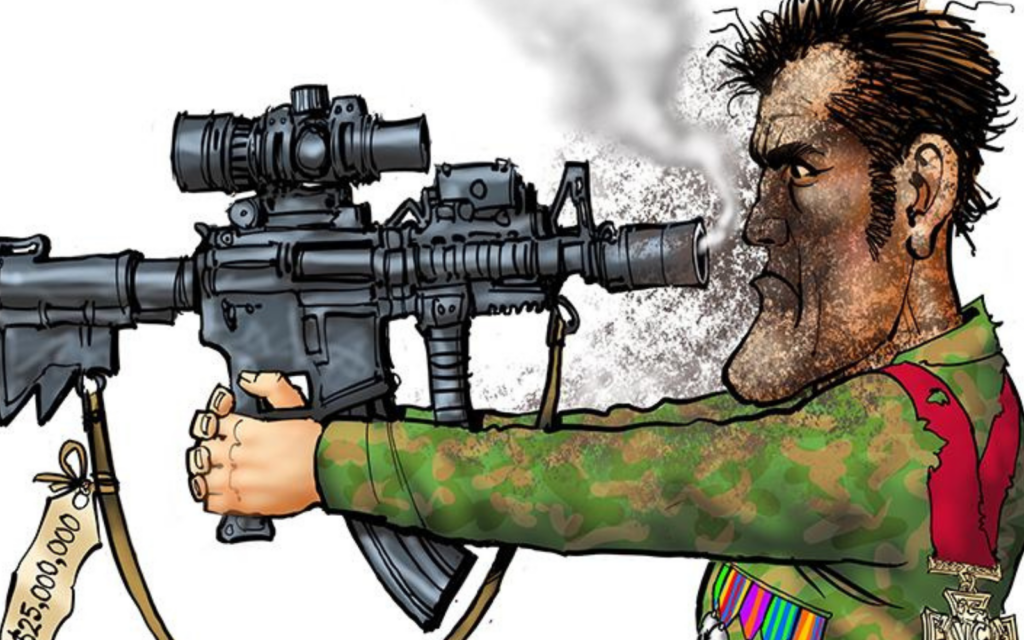Richard Wolstencroft, Director of The Melbourne Underground Film Festival (MUFF), last year famously stood in front of an overflowing theatre, screamed “fuck censorship” and illegally showed LA Zombie. When Australia’s acclaimed independent film, Somersault, swept up 13 ARIA Awards, Wolstencroft was there wearing a T-shirt that read “Somersault Sucks”. He spits venom upon the ruling elite controlling Australian cinema, claiming they’re destroying it with their banal filmmaking paradigm. He’s controversial, he’s notorious and he’s radical. As he states, “I am the self appointed anti-Phillip Adams to lead Australian Cinema forward.” However, he’s also a revolutionary, pithily demonstrated in the mantra of this year’s MUFF – Destroy All Movies.
“It’s not meant to be taken as ‘destroy all movies’ because obviously I love film. I’m obsessed with cinema. I probably have the largest video collection of anybody I know. I’m a real cinephile but I think there’s something fucked up going on in contemporary cinema. A lot of Hollywood films – I mean recently I went to go see something at the multiplex and I looked at what was on and I didn’t want to see a single thing like Harry Potter and this mindless video game rubbish. Like, growing up in the 70s and 80s, every week there was a new film by John Carpenter or David Cronenberg, and they were like genre films and obviously there were grindhouse films too, and the really excellent Tarantula and Kingdom Of The Spiders or some bizarre science fiction film like Battle Beyond The Stars which is basically a rip-off of Star Wars. These were really great interesting genre films and now we’re getting these big budget CGI video game pop songs – I mean that film Sucker Punch really summed it up – this is a film with fucking five hot girls and it’s boring. They’re all running around in school dresses and I’m thinking ‘that’s good’ but everything else – there’s no story, there’s no plot, it makes no sense…I think there’s a real movement in mainstream cinema and it’s also in arts cinema. You go to your art films and The Melbourne International Film Festival and they’re kind little polite little slices of the world and there’s something going on in cinema that’s boring. Basically we’re a reaction against [this]. So I guess that’s what we’re trying to say with ‘destroy all movies’. Just deconstruct them, you know, move on. Cinema’s changed I think and cinema needs to be exciting again. It needs to be challenging.”
When asked about the future of Australian cinema, Wolstencroft passionately points out its flaws and unequivocally expresses how it needs to change in order to survive. “The only films that have had any interest outside of this country are Chopper, Wolf Creek, Romper Stomper. These are the only films that travel, the really good aggressive genre films, these are the kind of films we need to be making…How the system works is that it’s basically kind of a Stalin-esque art system where you’re not meant to question it, and if you question it, you’re out. You’re fucked or whatever. And only people within the Stalin-esque mind-space get the funding. Now of course it’s not Stalin-esque communism that they’re promoting, but they’re promoting lame-arse, vaguely-left, vaguely feminist, wankfest rubbish. No one is interested in these films and there’s been 100 films that have had budgets of $1-2-3 million that have made $20,000…I guess MUFF stands at the other end of the spectrum. For example the first MUFF, one of the filmmakers that responded and that sent in their first feature was a guy named James Wan. He made a film called Stygian, and that won Best Guerrilla Film at MUFF and the next year they had a little trailer for a film they wanted to make called Saw. And of course they were fucked trying to get funding for it in Australia, no-one wanted to know, so they took it to Hollywood the following year and of course New Line decided to invest a million bucks into it and the rest is history. The greatest horror franchise in history, forget Nightmare On Elm St. forget Halloween; Saw is the greatest money-making and this could have been made here.”
MUFF, as Wolstencroft explains, was formed after his film, Pearls Before Swine, was rejected by The Melbourne International Film Festival (MIFF) in the late 90s and thus he became determined to set-up a festival that was open to genre films by talented directors even if the films were controversial. “They said it was too violent, or the festival director didn’t like it. Philip Brophy, who was a friend of mine, knew the people at MIFF and said ‘this guy’s a promoter, you’ll get a packed screen, just play his film’. They didn’t want to know. So I was kind of upset about that so I wrote an outraged email to an internet film zine and I got a response from about 50 filmmakers saying ‘my film was rejected from MIFF because it was a horror film’, ‘my film was rejected because it was a lesbian sex film’, and every film sounded fantastic so I just responded to them all and said ‘well all your films are in, I’m creating a film festival of my own’”.
This year’s MUFF will be headlined by A Serbian Film – a movie described by the MUFF brochure as “the sickest film we have ever played” – and The Life And Death Of A Porno Gang – “the second sickest film we have ever played”. Considering that last year’s MUFF illegally showed a film about gay zombies receiving sexual gratification from wounds on dead bodies, these are extraordinary claims. One must wonder what MUFF 2024 will show. “We always try to look for an interesting opening/closing night film. And we were offered A Serbian Film by Accent and The Life And Death Of A Porno Gang by Monster Pictures and they were both from Serbia, and they were both fucking ultra-intense horror graphic films. And I was like well this is definitely something…I watched A Serbian Film shortly after LA Zombie last year. I saw the uncut version of that, and I was like ‘whoa – fucking hell’. That film, I actually thought ‘I don’t think I can defend that film’, like uncut. And also, there’s no way you’re getting this passed the censor I’m telling you this right now. I just said ‘no way’. Not even that, I didn’t even want to have it in my fucking house so I just gave it back to the distributor and said ‘you’re not gonna get that passed. That’s the end of that’. And they said ‘oh no we’ll get it passed so we might cut something out’. I said ‘if you cut something out, come back to me’ so there was a cut version apparently that they submitted, and it got passed! And that’s the one we’re playing. Apparently there was about 90 seconds taking out. I can imagine which 90 seconds… The film I think does have some artistic merit but whether this film goes too far I honestly don’t know, and I think I wanna’ play it to say that maybe this film does go too far and I wanted to raise that issue which ties into the theme of ‘destroy all movies’. Because the censors want to destroy movies, I wanted to raise the theme in relation to cinema itself which I think is transforming. It’s becoming something else. Films are no longer shot on film, generally these days. So I wanted to take ’destroy’, [which] I guess is a Heideggerian idea that someone like Jaques Derrida uses as ‘deconstruction’ but in the original German it was used as ‘destroy’ as in there is an element of getting rid of something. And obviously there’s a lot of ramifications there because Heidegger was a fascist. He was a destroyer in various ways, intellectually.”
MUFF this year features four categories: MUFF Neu presents the ten best local and international indie/guerrilla films submitted to the festival, Mini MUFF showcases various short films from around the world, MUFF Academy includes workshops from Billy Marshall Stoneking and a discussion panel, and of course the retrospective section – Destroy All Movies.
Wolstencroft is quick to point to Iconoclast as one of MUFF Neu’s best. “It’s like four hours long. Boyd Rice is personally a major inspiration to myself. He’s like a real counter-culture guy and definite troublemaker. He was part of the movement of bands like Throbbing Gristle and Cabaret Voltaire and he was one of the first acts signed to Mute Records…Boyd’s this kind of guy. There were these books in the 80s called Re:Search. There’s one on pranks, on modern primitives, on industrial culture, and this was before the internet they were like cultural. You know how in the 90s everyone had body piercings and tattoos? That happened because one book called Modern Primitives by Research and Boyd for example is into body-piercing and stuff. He’s a fascinating cultural figure, a bit like a William Burroughs, or an Allen Ginsberg, except he’s not of the Beat generation he’s almost to a reaction to that.”
“Timothy Spanos made a film called Boronia Backpackers. We play a lot of his work. He’s a really interesting local filmmaker that does really interesting kind of films about kind of down-and-out young people getting into trouble doing drugs, misbehaving so it’s two guys in Amsterdam getting up to no good. This film Birthday is really great. It’s about hookers directed by J. Harkness…I highly recommend that. Needle is a great new Australian genre horror film starring Michael Dorman and Tahyna Tozzi. I really recommend that one. The Little Things is an interesting drama from Queensland that was funded by Screen Queensland. Come And Get Me was at the Bloodfest Film Festival I did that won all the awards so we’ll be replaying that one. F is really good. It’s about a couple of students who get an F and just come to class and seek revenge. 2012: Time For Change is Daniel Pinchbeck who’s a really interesting iconic Jewish guy in New York. A lot of people think the world’s gonna end next year, but he sees it as being more just we need to change the way we live, and I’m into this kind of philosophy. I’m into green deep ecology. I think the major problem is overpopulation, human beings are the problem. The fact that we just use resource and that we overpopulate everywhere we go, our civilisation is based on consumption and growth and this is not in harmony with the planet. So he tries to examine different ways to overcome these problems and that’s a really amazing documentary about that.” The list goes on.
“Billy Marshall Stoneking is coming down to a couple of drama workshops. One’s a one-day one and one is like a three-day one. He’s like a really interesting acting and drama teacher. You just go along and learn. He’s quite well respected. We’re also playing Saló and doing a little censorship panel on extreme cinema because that ties into A Serbian Film and The Life And Death Of A Porno Gang etc. We’ve got Jimmy Jack on the jury; he’s completely nuts. He wrote that film The Black Balloon. He’s a really interesting guy.”
Regardless of the criticism one may hold against Wolstencroft’s personal views, he deserves respect for his formation of MUFF as its insistence on defying censorship has created a passage for Australian talent to be discovered. “We just try and support films. It’s weird because our festival has discovered most of the new Australian talent like James Wan, Greg McLean, Scott Ryan who did that great film The Magician, Spierig brothers who did that great film Daybreakers, all their early shorts – the first film festival in the world to play any of their work has been MUFF. And I don’t know how we’ve done it. They’ve sent it to us because we’ve just got that reputation, we support genre and I just look for talent. Like James Wan’s first film it didn’t have a budget; it was a bit crap in some ways. You could see MIFF rejecting it…but it had these really interesting torture machines in it, that people were getting tied to and ripped apart. It was the early ideas for Saw. I just remember thinking ‘that’s just weird, that’s just interesting’ and it was the first beginnings of torture porn or whatever. That whole horror movement they pretty much created. I just thought there was something interesting about it so I played it. I look for ideas, I look for something a little different. And I think that’s what MUFF’s about. It’s about looking beyond the budget to creativity.”
The Melbourne Underground Film Festival is being hosted by Memo and Dog’s Bar from Friday August 19 until Saturday August 27. Check out muff.com.au for more info.







